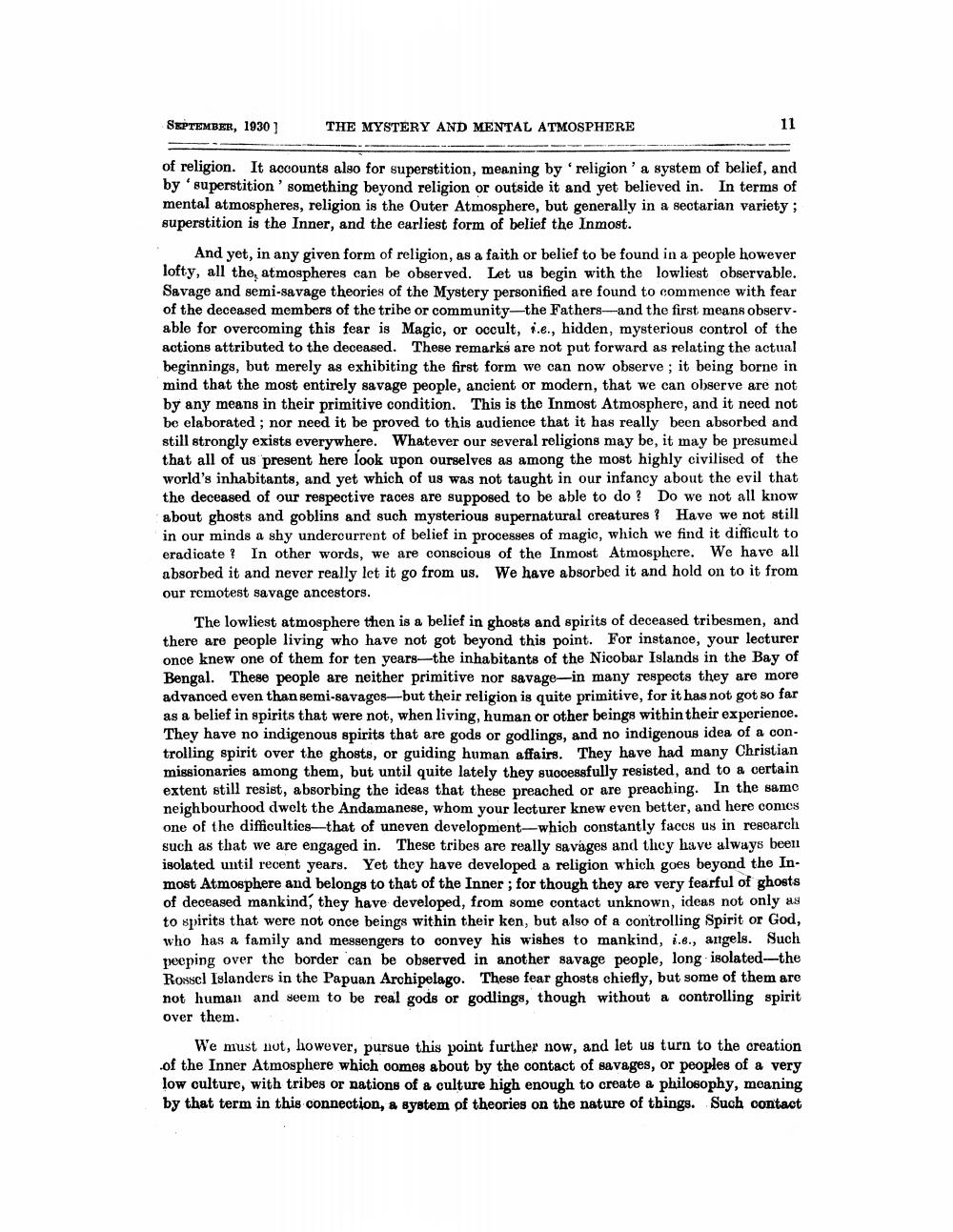________________
SEPTEMBER, 1930 ]
THE MYSTERY AND MENTAL ATMOSPHERE
of religion. It accounts also for superstition, meaning by religion' a system of belief, and by 'superstition' something beyond religion or outside it and yet believed in. In terms of mental atmospheres, religion is the Outer Atmosphere, but generally in a sectarian variety ; superstition is the Inner, and the earliest form of belief the Inmost.
And yet, in any given form of religion, as a faith or belief to be found in a people however lofty, all the atmospheres can be observed. Let us begin with the lowliest observable. Savage and semi-savage theories of the Mystery personified are found to commence with fear of the deceased members of the tribe or community--the Fathers-and the first means observ. able for overcoming this fear is Magic, or occult, i.e., hidden, mysterious control of the actions attributed to the deceased. These remarks are not put forward as relating the actual beginnings, but merely as exhibiting the first form we can now observe; it being borne in mind that the most entirely savage people, ancient or modern, that we can observe are not by any means in their primitive condition. This is the Inmost Atmosphere, and it need not be elaborated ; nor need it be proved to this audience that it has really been absorbed and still strongly exists everywhere. Whatever our several religions may be, it may be presumeil that all of us present here look upon ourselves as among the most highly civilised of the world's inhabitants, and yet which of us was not taught in our infancy about the evil that the deceased of our respective races are supposed to be able to do? Do we not all know about ghosts and goblins and such mysterious supernatural creatures? Have we not still in our minds a shy undercurrent of belief in processes of magic, which we find it difficult to eradicate? In other words, we are conscious of the Inmost Atmosphere. We have all absorbed it and never really let it go from us. We have absorbed it and hold on to it from our remotest savage ancestors.
The lowliest atmosphere then is a belief in ghosts and spirits of deceased tribesmen, and there are people living who have not got beyond this point. For instance, your lecturer once knew one of them for ten years—the inhabitants of the Nicobar Islands in the Bay of Bengal. These people are neither primitive nor savage-in many respects they are more advanced even than semi-savages--but their religion is quite primitive, for it has not got so far as a belief in spirits that were not, when living, human or other beings within their experience. They have no indigenous spirits that are gods or godlings, and no indigenous idea of a controlling spirit over the ghosts, or guiding human affairs. They have had many Christian missionaries among them, but until quite lately they successfully resisted, and to a certain extent still resist, absorbing the ideas that these preached or are preaching. In the same neighbourhood dwelt the Andamanese, whom your lecturer knew even better, and here comes one of the difficulties that of uneven development—which constantly faces us in research such as that we are engaged in. These tribes are really savages and they have always been isolated until recent years. Yet they have developed a religion which goes beyond the Inmost Atmosphere and belongs to that of the Inner; for though they are very fearful of ghosts of deceased mankind, they have developed, from some contact unknown, ideas not only a to spirits that were not once beings within their ken, but also of a controlling Spirit or God, who has a family and messengers to convey his wishes to mankind, 1.6., angels. Such peeping over the border can be observed in another savage people, long isolated-the Rosscl Islanders in the Papuan Archipelago. These fear ghosts chiefly, but some of them are not human and seem to be real gods or godlings, though without a controlling spirit over them.
We must not, however, pursue this point further now, and let us turn to the creation of the Inner Atmosphere which comes about by the contact of savages, or peoples of a very low culture, with tribes or nations of a culture high enough to create a philosophy, meaning by that term in this connection, a system of theories on the nature of things. Such contact




